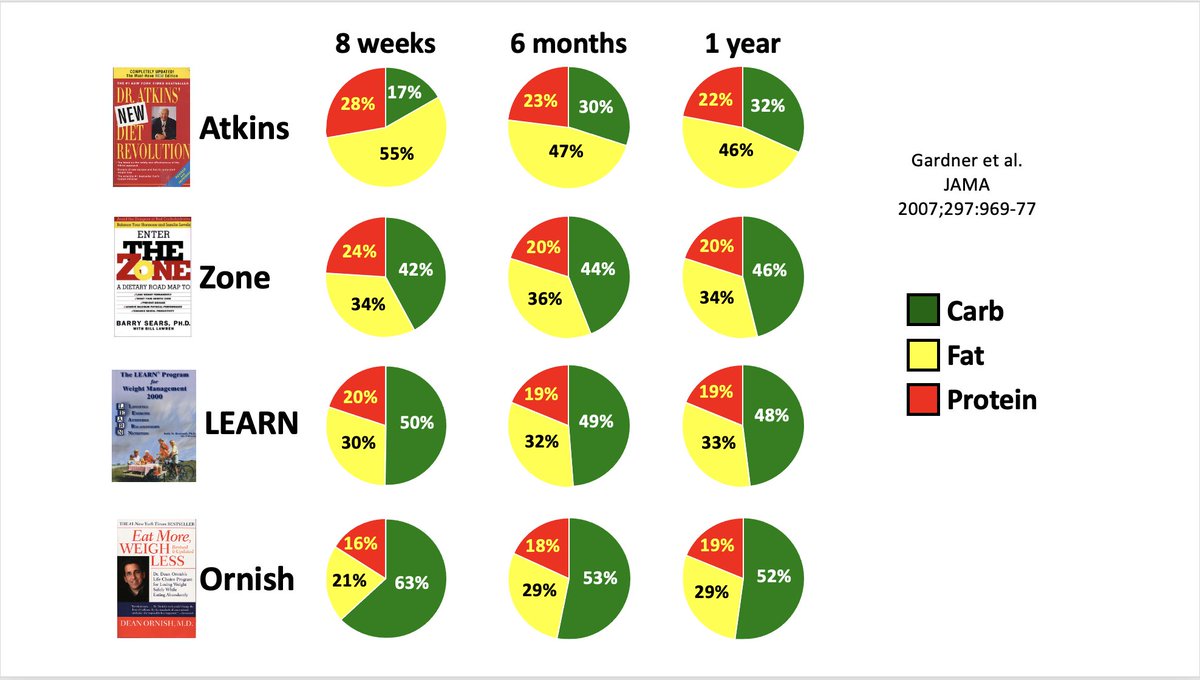High vs. Low Protein
A few wks ago, @ScepticalDoctor & @theproof brought up this ??. I was too busy @ the time, & it's a tough topic - limited base of quality evidence to draw from.
Got more time now.
Time for a protein tweetorial?
For starters, how high is "high"?
g? %?
A few wks ago, @ScepticalDoctor & @theproof brought up this ??. I was too busy @ the time, & it's a tough topic - limited base of quality evidence to draw from.
Got more time now.
Time for a protein tweetorial?
For starters, how high is "high"?
g? %?
And how low is "low"?
There aren't correct answers. There is no consensus on grams or % of what qualifies as "low" or "high".
And there is the important consideration of plant vs. animal protein, and translating "protein" into "food". But I'll save that topic for another day.
And there is the important consideration of plant vs. animal protein, and translating "protein" into "food". But I'll save that topic for another day.

In 2009, the POUNDS LOST weight loss diet study was published in NEJM. The idea was to simultaneously test differences in protein, fat and carbohydrate.
2 protein levels: 15% vs 25%
2 fat levels: 20% vs. 40%
4 carb levels: 65%, 55%, 45%, 35%
Elegant eh?
pubmed.ncbi.nlm.nih.gov/19246357/
2 protein levels: 15% vs 25%
2 fat levels: 20% vs. 40%
4 carb levels: 65%, 55%, 45%, 35%
Elegant eh?
pubmed.ncbi.nlm.nih.gov/19246357/

Let’s make you nutrition Czar for the day, and you get to review this study design proposal and suggest changes before it is ever conducted.
Do you think the choice of 15% vs. 25% was the best choice for “low” vs. “high”, or would you have picked something else?
Do you think the choice of 15% vs. 25% was the best choice for “low” vs. “high”, or would you have picked something else?
The real reviewers agreed that 15% vs. 25% was an appropriate choice.
That was what they tried to implement
Design is one thing.
Implementation is another.
Adherence can be challenging in human studies.
At the end of 2 years, whadya think the ACTUAL protein intake levels were?
That was what they tried to implement
Design is one thing.
Implementation is another.
Adherence can be challenging in human studies.
At the end of 2 years, whadya think the ACTUAL protein intake levels were?
According to the extensive dietary assessment methods they used, the actual difference at the end of 2 years was JUST 20% vs. 21%
At that level of differentiation, they actually couldn’t test their hypothesis as to whether “low” vs. “high” was better for weight loss.
Agreed?
At that level of differentiation, they actually couldn’t test their hypothesis as to whether “low” vs. “high” was better for weight loss.
Agreed?

Important note: These were top researchers at Harvard and Pennington.
Adherence to dietary change in research studies is very challenging on two counts:
1.Achieving the change
2.Documenting adherence accurately
Adherence to dietary change in research studies is very challenging on two counts:
1.Achieving the change
2.Documenting adherence accurately

We found something very similar in our 2007 JAMA publication of the #ATOZ weight loss diet study.
Early on, when enthusiasm was likely highest, the reported protein intakes ranged from 16% for Ornish, to 28% for Atkins.
But look out to 1 year: Full range was just 19% - 22%
Early on, when enthusiasm was likely highest, the reported protein intakes ranged from 16% for Ornish, to 28% for Atkins.
But look out to 1 year: Full range was just 19% - 22%

Similar in our #DIETFITS study (JAMA 2018).
Baseline protein intake is 17-18%
Early differences in study (3 months) 22% vs. 26%
But 1 year out, when we still had substantial fat vs. carb diffs, protein difference was just 21% vs. 23%
(Note: protein Kcal similar to baseline)
Baseline protein intake is 17-18%
Early differences in study (3 months) 22% vs. 26%
But 1 year out, when we still had substantial fat vs. carb diffs, protein difference was just 21% vs. 23%
(Note: protein Kcal similar to baseline)

And just a few weeks ago, @sguyunet shared the impressive graphic from USDA ERS data showing that while fat and carb intake underwent notable changes from 1909-2006, protein intake levels were stunningly stable. 

So here is my “avoid-the-real-question” response to @scepticalDoctor and @theproof regarding low vs. high protein.
Moot point: In general, people consume very similar amounts of protein
MOST people don’t/can’t achieve & SUSTAIN meaningfully diff levels of protein
Feedback?
Moot point: In general, people consume very similar amounts of protein
MOST people don’t/can’t achieve & SUSTAIN meaningfully diff levels of protein
Feedback?
• • •
Missing some Tweet in this thread? You can try to
force a refresh











